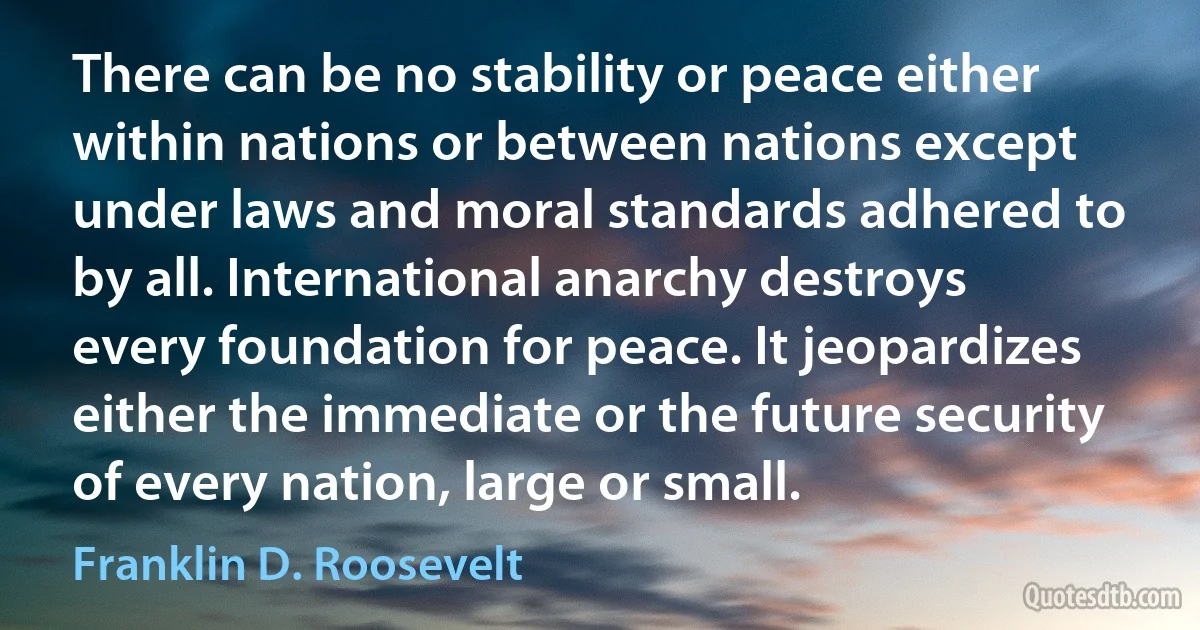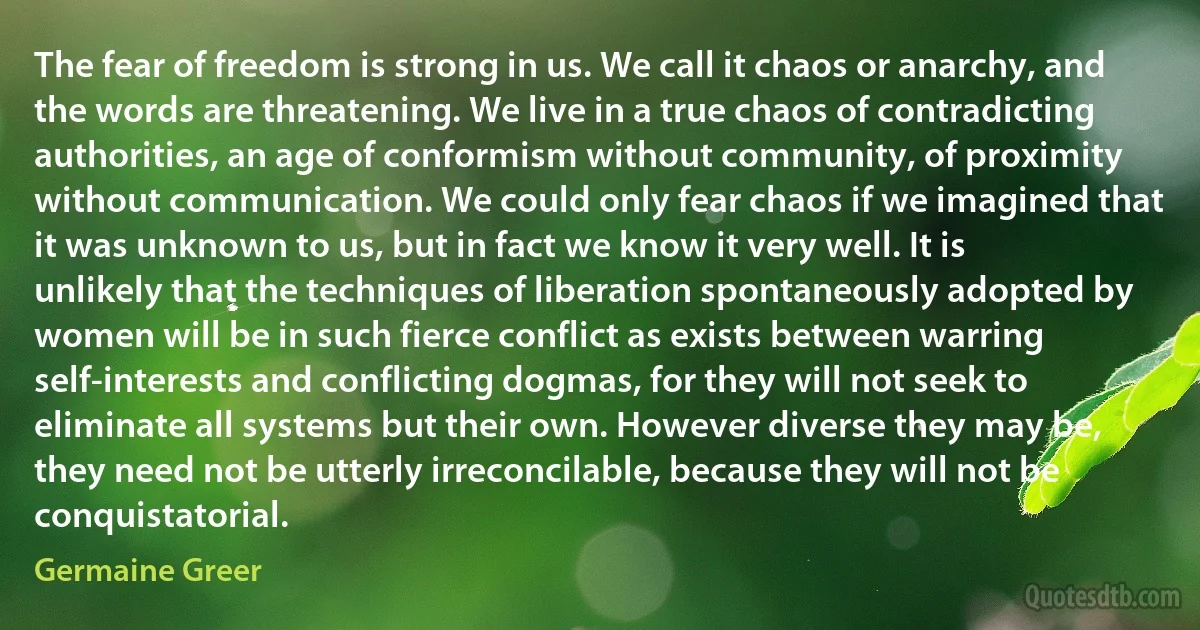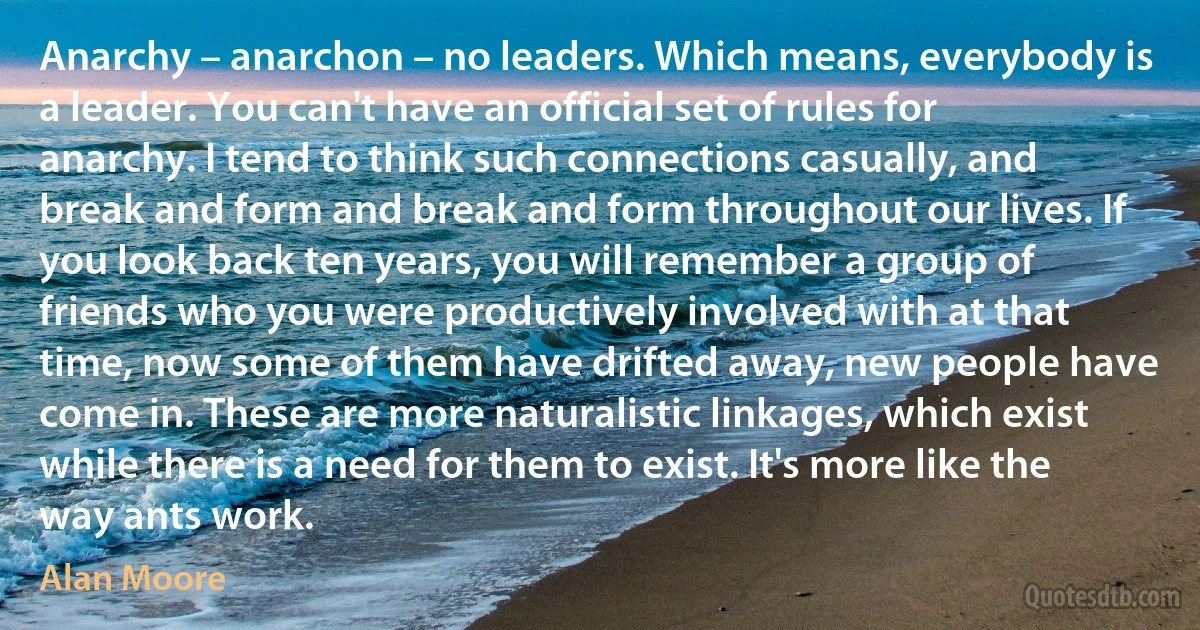Anarchy Quotes - page 11
The history of any nation follows an undulatory course. In the trough of the wave we find more or less complete anarchy but the crest is not more or less complete Utopia, but only, at best, a tolerably humane, partially free and fairly just society that invariably carries within itself the seeds of its own decadence.

Aldous Huxley
I say that there are two systems of policy to apply to the management of what is commonly called the Eastern question, but which resolves itself into the geographical question, namely, the possession of that site which commands the empire of the world-the city of Constantinople. There is that school of opinions which I call British opinions, advocated by the noble Lord the Leader of this House (Lord J. Russell) and the noble Lord the Secretary of State for the Home Department (Viscount Palmerston), who believe in the vitality of Turkey, that it may remain an independent and even a progressive country, and form a powerful and sufficient barrier against the encroachment of Russia. There is the other school, which I call the school of Russian polities, that believes that Turkey is exhausted; that all we can do is, by gradually enfranchising the Christian population, to prevent, when its fall takes place, perfect anarchy, and contemplates the possibility of Russia occupying the Bosphorus.

Benjamin Disraeli
Her Majesty's new Ministers proceeded in their career like a body of men under the influence of some deleterious drug. Not satiated with the spoilation and anarchy of Ireland, they began to attack every institution and every interest, every class and calling in the country...As time advanced it was not difficult to perceive that extravagance was being substituted for energy by the Government. The unnatural stimulus was subsiding. Their paroxysms ended in prostration. Some took refuge in melancholy, and their eminent chief alternated between a menace and a sigh. As I sat opposite the Treasury Bench the Ministers reminded me of one of those marine landscapes not very unusual on the coasts of South America. You behold a range of exhausted volcanoes. Not a flame flickers on a single pallid crest. But the situation is still dangerous. There are occasional earthquakes, and ever and anon the dark rumbling of the sea.

Benjamin Disraeli
The passages in which he introduces "anarchist" and "anarchy" are historically important enough to merit quotation, since they not merely show these words being used for the first time in a socially positive sense, but also contain in germ the justification by natural law which anarchists have in general applied to their arguments for a non-authoritarian society.

George Woodcock
The three most ancient opinions concerning God are Anarchia, Polyarchia, and Monarchia. The first two are the sport of the children of Hellas, and may they continue to be so. For Anarchy is a thing without order; and the Rule of Many is factious, and thus anarchical, and thus disorderly. For both these tend to the same thing, namely disorder; and this to dissolution, for disorder is the first step to dissolution. But Monarchy is what we hold in honor.

Gregory of Nyssa
One of the reasons I'm a musician is because music isn't divisive. It's a medium where you don't have to abide by divisions. The whole idea is anarchy and the best music just doesn't give a fuck. And too much music is just so conservative these days. So I really don't want to be careful about anything. And there's so much music that's trying to be offensive these days, trying to be aggressive and abrasive. But it's just cheap and manipulative. So if I can offend someone in a good way and challenge their belief system, then I think that's positive. I mean, I wonder what their problem with it is? I don't have a problem. Wanda Coleman doesn't have a problem with me singing like that.

Beck
My considered judgment, after years of scrutiny of, and sometimes harrowing activity in the anarchist milieu, is that anarchists are a main reason - I suspect, a sufficient reason - why anarchy remains an epithet without a prayer of a chance to be realized. Most anarchists are, frankly, incapable of living in an autonomous cooperative manner. A lot of them aren't very bright. They tend to peruse their own classics and insider literature to the exclusion of broader knowledge of the world we live in. Essentially timid, they associate with others like themselves with the tacit understanding that nobody will measure anybody else's opinions and actions against any standard of practical critical intelligence; that no one by his or her individual achievements will rise too far above the prevalent level; and, above all, that nobody challenges the shibboleths of anarchist ideology.

Bob Black
[I]ncreasingly the use of violence has become not the last resort of the desperate, but the first resort of those whose simple unconstructive aim is anarchy. That we must all surely resist. Anarchy is not a prescription for peace, justice and progress. It achieves nothing but the suffering of innocent men and women.

Edward Heath
There is one writer, and, perhaps, many who do not write, to whom the contraction of these pernicious privileges appears very dangerous, and who startle at the thoughts of England free, and America in chains. Children fly from their own shadow, and rhetoricians are frighted by their own voices. Chains is, undoubtedly, a dreadful word; but, perhaps, the masters of civil wisdom may discover some gradations between chains and anarchy. Chains need not be put upon those who will be restrained without them. This contest may end in the softer phrase of English superiority and American obedience.
We are told, that the subjection of Americans may tend to the diminution of our own liberties; an event, which none but very perspicacious politicians are able to foresee. If slavery be thus fatally contagious, how is it that we hear the loudest yelps for liberty among the drivers of negroes?

Samuel Johnson
We only know the world as we have lived in it. A lot of things we thought were givens have turned out to be local and temporary phenomena. Capitalism and communism felt like they were always going to be around, but it turns out they were just two ways of ordering an industrial society. If you were looking for more fundamental human political poles, you'd take anarchy and fascism, for my money. Which are not dependent upon economic trends because they are both a bit mad. One of them is complete abdication of individual responsibility into the collective, and one of them absolute responsibility for the individual. I think these will both still be with us, but fascism becomes less and less possible. We have to accept that we are moving towards some sort of anarchy.

Alan Moore
The whole program of evolution seems to be to diversify, because in diversity there is strength.
And if you apply that on a social level, then you get something like anarchy. Everybody is recognized as having their own abilities, their own particular agendas, and everybody has their own need to work cooperatively with other people. So it's conceivable that the same kind of circumstances that obtain in a small human grouping, like a family or like a collection of friends, could be made to obtain in a wider human grouping like a civilization.

Alan Moore
A daring pilot in extremity;
Pleas'd with the danger, when the waves went high
He sought the storms; but for a calm unfit,
Would steer too nigh the sands, to boast his wit.
Great wits are sure to madness near alli'd;
And thin partitions do their bounds divide:
Else, why should he, with wealth and honour blest,
Refuse his age the needful hours of rest?
Punish a body which he could not please;
Bankrupt of life, yet prodigal of ease?
And all to leave, what with his toil he won
To that unfeather'd, two-legg'd thing, a son:
Got, while his soul did huddled notions try;
And born a shapeless lump, like anarchy.

John Dryden
A free culture has been our past, but it will only be our future if we change the path we are on right now. Like Stallman's arguments for free software, an argument for free culture stumbles on a confusion that is hard to avoid, and even harder to understand. A free culture is not a culture without property; it is not a culture in which artists don't get paid. A culture without property, or in which creators can't get paid, is anarchy, not freedom. Anarchy is not what I advance here. Instead, the free culture that I defend in this book is a balance between anarchy and control. A free culture, like a free market, is filled with property. It is filled with rules of property and contract that get enforced by the state. But just as a free market is perverted if its property becomes feudal, so too can a free culture be queered by extremism in the property rights that define it. That is what I fear about our culture today. It is against that extremism that this book is written.

Lawrence Lessig
I sat there for a long time, and thought about a lot of things. Foremost among them was the suspicion that my strange and ungovernable instincts might do me in before I had a chance to get rich. No matter how much I wanted those things that I needed money to buy, there was some devilish current pushing me off in another direction - toward anarchy, poverty and craziness. That maddening delusion that a man can lead a decent life without hiring himself out as a Judas goat.

Hunter S. Thompson



